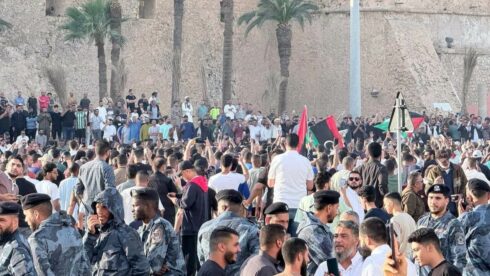Libya’s internationally-recognized Government of National Unity (GNU) is facing a serious crisis, with several ministers resigning amid protests in the capital, Tripoli, calling on Prime Minister Abdul Hamid al-Dbeibah to step down.
The crisis appears to be a direct result of the clashes that broke out in Tripoli earlier in the week after the assassination of Abdel Ghani al-Kikli, also known as “Gheniwa”, the head of the powerful Stability Support Authority (SSA) that is backed by the Presidential Council.
Gheniwa was killed on May 12 inside a base controlled by the 444th Brigade, led by Mahmoud Hamza, a militia leader aligned with al-Dbeibah who is allied to Turkey. Syrian mercenaries, who were brought to Libya in 2020 by Turkey, were reportedly involved in the incident. His death triggered a wave of retaliatory clashes, leaving at least six dead on the first day, according to security sources.
The first round of clashes came to a halt on May 13, with Dbeibah declaring a military operation had dismantled “irregular” militias. However, the fighting resumed early on May 14, with the Libyan Red Crescent reporting the death of at least one person.
By May 15, a ceasefire was announced, marking the end of the SSA. However, protests against Dbeibah broke out in Tripoli.
The protests gained momentum on May 16, with thousands gathering in the Martyrs’ Square and changing anti-government slogans. Some carried signs that read: “We want a constitutional referendum” and “From the streets of Libya, we want transparent general and presidential elections,” after calls were made on social media.
The government later announced that a police officer was killed in an “attempted assault” on the office of the prime minister.
“He was shot by unknown attackers and succumbed to his injuries,” a statement said, adding that members of a group who mixed with the protesters tried to set the office on fire using Molotov cocktails.
In response to the protests, Economy and Trade Minister Mohamed al-Hawij, Local Government Minister Badr Eddin al-Tumi and Minister of Housing Abu Bakr al-Ghawi announced their resignation.
Counter-protests supportive of Dbeibah were organized in the city of Misrata, a stronghold of the 444th Brigade and other militia groups that backed the primer.
Libya plunged into chaos following a NATO-backed uprising that toppled and killed Libyan leader Muammar Gaddafi in 2011. The country is now split between the GNU in the west, which is supported by an array of militia groups and Syrian mercenaries, and a rival government based in Benghazi in the east, backed by the House of Representatives and the Libyan National Army.
All in all, it appears that Dbeibah’s attempt to consolidate power in western Libya has backfired, threatening the legitimacy of the GNU as a whole. With that, Turkey’s influence in the country is under an unprecedented threat.
_______________________________________________________________________________________________________________________
SouthFront: Analysis and Intelligence
NOW hosted at southfront.press
Previously, SouthFront: Analysis and Intelligence was at southfront.org.
The .org domain name had been blocked by the US (NATO) (https://southfront.press/southfront-org-blocked-by-u-s-controlled-global-internet-supervisor/) globally, outlawed and without any explanation
Back before that, from 2013 to 2015, SouthFront: Analysis and Intelligence was at southfront.com







government? libya?
dictatorship , just like haiti , jordan , saudi arabia , uae , quatar and even the us aipac dc kult and all many , many , many more like syria and ukraine !
“nato-backed uprising’…boy, that’s being generous. so who’s behind this? haftar is us/israel/sometimes russia…the rest are turk turds. revenge for syria? who knows? it’s continued chaos they’re after. they took the richest state in africa, turned the people against their own best interests, murdered qaddafi and destroyed the entire country. now they want to keep it that way. do arabs even have a clue when something is good for them? when they are being used and abused?
160 tons of libyan gold disappeared overnight. like all the gold stored in the basement of wtc7.